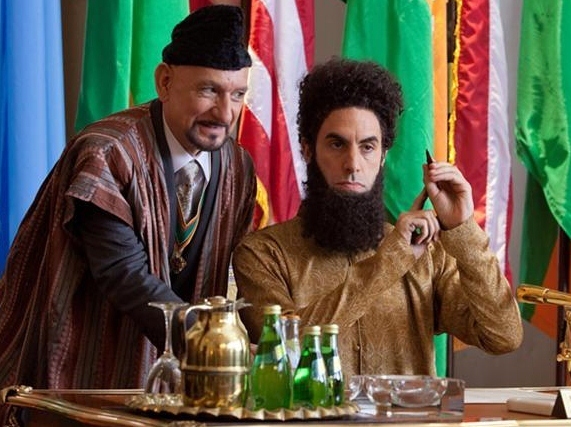
Sacha Baron Cohen can’t trick total strangers into becoming part of his shtick as he did with both “Borat” and “Bruno.”
That leaves him tied to conventional film comedy, and the results aren’t pretty based on his latest film, “The Dictator.”
The film finds Baron Cohen playing a cruel, anti-semitic leader who comes to America, loses his country but gains a hairy gal pal to the left of Howard Zinn. The structure is in place for an epic romp, one with political satire nibbling around the edges.
What emerges is a crush of casually hobbled together gags, too often beneath Baron Cohen. That the film wraps with an anti-American rant that slams the brakes on the film’s anarchic spirit proves Baron Cohen’s instincts are slip-sliding away from his glorious days playing Borat.
Baron Cohen is General Aladeen, the undisputed ruler of the oil-rich nation known as the Republic of Wadiyah. The general comes to America to speak before the United Nations to settle fears that his country is building a nuclear weapon for murderous purposes. Heck, even Aladeen can’t say the plans are for peaceful energy use without breaking into a silly grin. But the international charade must go on.
Little does Aladeen know that his trusted adviser (Ben Kingsley) is plotting to take over the country and install a democratic regime. Why? To secure new, lucrative oil contracts, of course.
Even in a film focusing on a vile Middle Eastern dictator, Big Oil is the Bigger Villain.
The general ends up getting lost in the Big Apple, befriending a Vegan hippie (Anna Faris) and plotting his way back to power.
The template gives Baron Cohen, once more working with director Larry Charles, room for grossout humor, verbally dexterous one-liners and plenty of pratfalls. Some hit the mark – hard. Others pull no punches, like the general’s near-constant anti-Jewish rhetoric and frivolously misogynistic banter. Yet the film asks us to rally behind the general, curse the oil barons and accept some pretty flimsy comic setups.
The strain for laughs starts early, when the normally great John C. Reilly is given a near-humiliating cameo as a racist American operative. Later, an Asian business man chats up his sick carnal desires, a limp running gag which leads to an even more embarrassing cameo by Edward Norton.
We’re also treated to Aladeen defecating on people, a vagina-cam style gag and other bits too gross to describe.
The hit or miss approach is palatable – for a while. But the film’s final third includes a silly pregnancy sequence, a failed romantic subplot and a teeth-grinding speech that feels like it was written at the height of Hollywood’s Bush Derangement Syndrome.
Aladeen argues a dictatorship is preferable to a democracy like the U.S. where leaders lie to get the country into war, torture people, rig elections, hold blacks in prison and the one percent rule over the 99 percent.
Up until then, “The Dictator” had spread its comic fire across the ideological landscape, gently mocking Aladeen’s uber-liberal gal pal and cruel dictators who live and die by their selfish whims.
“The Dictator” deserves brickbats for losing touch with reality. When President George W. Bush kept troops in Iraq to protect a fragile democracy, the Left went ballistic and marched against him. In “The Dictator,” young, scruffy protesters hit the streets to support Wadiya’s democratic shift, and world media outlets trumpeted the news that the country would finally offer free and fair elections.
When Iranian leader Mahmoud Ahmadinejad visited Columbia University back in 2007, we didn’t see massive protests against him and his cruel leadership. But that’s what happens when General Aladeen comes to town. And how can the screenplay include a warning from the U.N. to Wadiya to allow weapons inspectors … or face a military strike?
These are minor notes, but a shrewd satirist wouldn’t hit them so squarely.
“The Dictator” offers boldness along with its political naivety even if Islam isn’t directly tweaked or addressed as a source of Aladeen’s behavior. But what’s sorely missing is the manic energy Baron Cohen brought to both Borat and Burno.
Here, Aladeen’s vocal intonations are off putting and inconsistent. Frankly, he doesn’t sell the character, nor does he totally immerse himself within him. His eyes too often look blank, disconnected, as if the lack of a sizable disguise left him adrift.
“The Dictator” could have struck out against targets rarely hit by modern satirists. Instead, it’s comfortable swatting the same old villains while indulging in potty humor meant to distract us from the lack of seriously funny wit.

COMMENTS
Please let us know if you're having issues with commenting.